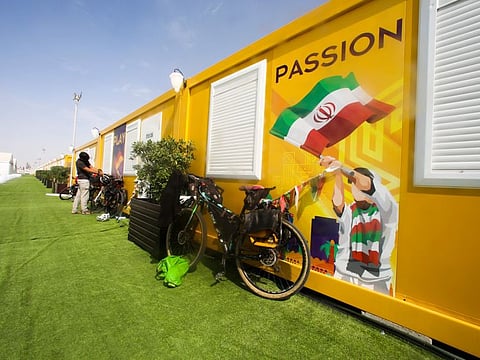Qatar donates World Cup mobile homes to earthquake survivors
Initial batch of 350 out of 10,000 structures shipped out on Sunday

Dubai: Qatar plans to send 10,000 cabins and caravans from last year’s World Cup to provide shelter for survivors of the Turkish earthquakes, officials said.
The gas-rich Gulf nation says it had always planned to donate the mobile homes. They were needed to help house some of the 1.4 million fans who descended on the country during soccer’s biggest tournament.
An initial batch of 350 structures was shipped out on Sunday, the Qatar Fund for Development said.
Tens of thousands of buildings were destroyed or severely damaged, leaving millions homeless. As shelters filled up in the days after the quake many were forced to sleep outside in wet, wintry weather.
Qatar and other wealthy Gulf countries have joined the global effort to send rescuers and aid to the stricken region. The United Arab Emirates has pledged $100 million for relief efforts. Saudi Arabia has dispatched eight planes loaded with supplies to Turkey and Syria.
The eighth Saudi flight landed in government-held Aleppo, in northern Syria, on Tuesday. Saudi Arabia was a strong supporter of the opposition at the height of Syria’s civil war and — unlike other Arab countries — has shown little interest in any rapprochement with President Bashar Assad.
Meanwhile, aid agencies and governments stepped up efforts Tuesday to send help to parts of Turkey and Syria, but a week after the disaster many of those who lost their homes were struggling to meet basic needs, like finding shelter from the bitter cold.
The situation was particularly desperate in Syria, where a 12-year civil war has complicated relief efforts and meant days of wrangling over how to even move aid into the country, let alone distribute it. Some people there said they have received nothing. In Turkey, meanwhile, families huddled in train cars.
On Monday, the United Nations announced a deal with Damascus to deliver UN aid through two more border crossings from Turkey to rebel-held areas of northwest Syria — but the needs remained enormous.
Ahmad Esmail Sulaiman set up a shelter of blankets outside his damaged house in the town of Jinderis, one of the worst-hit communities in northwest Syria. He was afraid to move his family back into a house that might not be structurally sound, so 18 people slept outside under the makeshift tent.
Tents in short supply
“We sit but can’t sleep lying down here,” he said. “We are waiting for a proper tent.”
Mahmoud Haffar, head of the local council in the town, said that locals have been able to scrounge up about 2,500 tents so far, but some 1,500 families still remain without shelter — as nighttime temperatures fall to around minus 4 degrees Celsius (26 degrees Fahrenheit).
“We are on day nine and we are still hearing the question of when will aid get in,” said Haffar.
While tents have been in short supply, one women said the town had a surplus of donated bread and water.
To the southwest, in government-held Latakia, Raeefa Breemo said only those packing into shelters seemed to be getting aid.
“We need to eat, we need to drink, we need to survive. Our jobs, our lives, everything have stopped,” Breemo said.
Much of the water system in the quake-hit region was not working, and Turkey’s health minister said samples taken from dozens of points of the water system showed the water was unsuitable to drink.
In the Turkish port city of Iskenderun, displaced families have sheltered in train carriages since last week.
While many have left in recent days for nearby camps or other parts of Turkey, dozens of people were still living in the trains on Tuesday.
“The wagons have become our home,” 50-year-old Nida Karahan told Anadolu Agency.
Sign up for the Daily Briefing
Get the latest news and updates straight to your inbox



